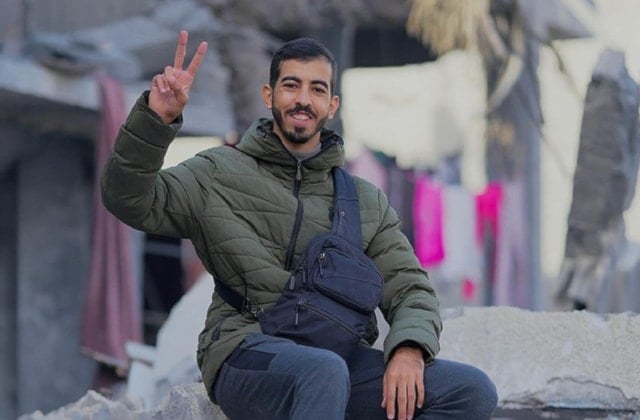Gaza Palestinian journalist Saleh al-Jafarawi killed by collaborators
Journalist Saleh al-Jafarawi was killed in southern Gaza while reporting, as media groups condemn ongoing Israeli attacks on Palestinian press workers.
-

Palestinian journalist Saleh al-Jafarawi in an undated image in Gaza, occupied Palestine (Social media)
Renowned Palestinian journalist Saleh al-Jafarawi was martyred on Sunday after being killed by Israeli collaborators in Gaza while preparing a news report.
According to local sources, al-Jafarawi was shot while working on Street 8, south of Gaza City, as he documented the situation in the area following recent developments on the ground. Witnesses said he had been preparing a report when armed members of a clan collaborating with the Israeli occupation opened fire, killing him instantly.
For the past two years, al-Jafarawi has been a prominent voice in the coverage of the Israeli war on Gaza, documenting atrocities and exposing war crimes to international audiences. His reporting became widely recognized for highlighting the human suffering, destruction, and resilience of the Palestinian people.
أعظم شعوب الأرض ✌🏻🇵🇸 pic.twitter.com/s2hkEOt3Z0
— صالح الجعفراوي | Saleh Aljafarawi (@S_Aljafarawi) October 12, 2025
Al-Jafarawi voices gratitude for solidarity
When the recent ceasefire in Gaza was confirmed, al-Jafarawi shared a heartfelt message from northern Gaza, expressing gratitude to all who stood by the Palestinian cause, from protesters and boycotters to artists, athletes, and activists who amplified Gaza’s voice around the world.
He also extended thanks to the activists behind the Gaza Sumud Flotilla and the Freedom Flotilla, both of which sought to break the siege and deliver aid to the Strip.
Yet his final words carried a powerful plea to the world: “Yes, the war has ended, but don’t turn your attention away from Gaza. Stay with Gaza always, because Gaza needs your voice, especially in the coming stage.”
He concluded his message by reaffirming the steadfastness of the Palestinian people: “We are the people of this land, and we have the right to live on it.”
Largest graveyard for journalists in modern history
Anthony Bellanger, a French-Belgian journalist, trade unionist, and historian, delivered a searing reflection in The Guardian, channeling the outrage of media workers worldwide as they watch colleagues in Gaza being killed with what he describes as Israeli impunity.
For Bellanger, history will remember the witnesses. In Gaza, that means remembering Anas al-Sharif, a young reporter killed on August 10, 2025, and the 222 other Palestinian journalists slain over the past two years, according to data from the International Federation of Journalists (IFJ). Those who sought to silence these voices, he writes, will carry condemnation forever.
For two years, Gaza has been the most dangerous place on earth to practice journalism. "Israel" has barred foreign reporters from entering, leaving Palestinian journalists, most of them members of the Palestinian Journalists’ Syndicate, affiliated with the IFJ, as the sole chroniclers of the war. They work without protection, often with their families equally exposed, and too often under direct Israeli fire.
The scale of the loss is unprecedented. Since its founding in 1926, the IFJ has not recorded such mass killings of journalists, not during World War II, nor in Vietnam, Korea, Syria, Afghanistan, or Iraq. Gaza, Bellanger argues, is now the largest graveyard for journalists in modern history.
Intentional killings
He insists these killings are not random. They represent a deliberate strategy: eliminate the witnesses, seal Gaza off from international eyes, and control the narrative. With Israeli Prime Minister Benjamin Netanyahu openly vowing to “recolonize” Gaza, information warfare is seen as inseparable from military conquest. Colonization, Bellanger writes, also means erasing the ruins, the victims, and those who dare to tell their stories.
Displacement has only deepened the crisis. Hundreds of thousands have fled southward, but the south offers no sanctuary, only overcrowding, bombardment, and entrapment between the sea and the siege. Journalists share this suffocating reality, working inside an enclave where each day of survival is more uncertain than the last.
Meanwhile, the international community’s response has been little more than symbolic. Recognition of Palestinian statehood at the UN, while historically significant, comes too late to save the living or deliver justice to the killed. The UN remains paralyzed, major powers complicit through silence and arms sales, and Palestinian reporters continue their mission alone, often to the point of death.

 4 Min Read
4 Min Read








